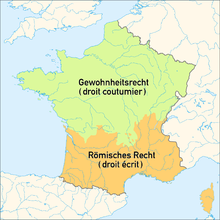Legal history of France
The legal history of France can be divided into the history of the old law since the fall of the Western Roman Empire on the one hand and more recent developments on the other, which began with the beginning of efforts to standardize and codify.
The ancien droit

Even after the fall of the Western Roman Empire , Roman law in southern Gaul was very influential. The Lex Romana Visigothorum was one of the most important sources of law there until the 12th century . In the course of time, its content under Roman law was mixed up - partly due to ignorance of Roman law - with local rights to Vulgar law . But as early as the 12th century the study of the Justinian Corpus Iuris Civilis at the universities of Montpellier and Toulouse took root. For the Germanic conqueror tribes in Northern Gaul, up to the Carolingians, according to the principle of personality, the respective Germanic people's law was decisive, sometimes also in the form of written records ( lex Salica , lex Ripuaria ). From the 12th century onwards, a comparatively clear dividing line emerged at the Loire level : in the south, the common law (known as droit écrit ), which had arisen from the Corpus Iuris Civilis , was in effect in the south, and in the north the droit, based on the Germanic-Franconian- feudal customary law , applied coutumier. This dichotomy lasted until 1789.
The 13th century was marked by the scientification of law. The establishment of the University of Paris was followed by a more intensive academic penetration of common law; To speak of a real reception of this right in complexu in northern France, as in Germany, would nevertheless be a mistake. In the 15th century, Charles VII drove the written fixation of customary law from 1454, by the end of the 16th century this process of writing for the great legal books (French. Grandes coutumes ) was completed: Pariser Rechtsbuch (1510-1580), Rechtsbuch von Duchy of Burgundy ( you coutume duché de Bourgogne ; 1459 to 1576), the rule book by Klein Kingdom (1539-1580), law book of Duchy of Orléans ( coutume d'Orléans ; 1509-1583). This paved the way for the common law scholarship of the 16th century, the most famous representatives of which are Charles Dumoulin (Molinaeus) and Bertrand d'Argentré . The representatives of the elegant jurisprudence Jacques Cujas and Hugo Donellus are of similar rank for the processing of the common law of French style .
With the intensified centralization under Louis XIV. And Louis XV. In the 17th and 18th centuries, there was also a politically motivated standardization of law by the royal ordonnances : in 1667 the ordonnance was issued to reform civil proceedings ; under Colbert the order of trade and the law of the sea was enacted , under d'Aguesseau ordinances on donations, wills and entails. In the field of jurisprudence, the Antoine Loysel collection of legal proverbs in the Institutes coutumières, Jean Domat's Les loix civiles dans leur ordre naturel and Robert-Joseph Pothier's Traité des obligations should be emphasized.
The codifications
During the French Revolution , the idea of counteracting legal fragmentation through codification first arose. The announcement in the constitution of 1791 was followed by three designs by Cambacérès , none of which were implemented. The project could only be implemented with the consolidation of political relations under Napoléon : On August 13, 1800, he was the first consul to appoint a commission consisting of Tronchet , Maleville , Bigot de Préameneu and Portalis , which was able to present a first preliminary draft after only four months. After a revision phase in the Council of State , which Napoléon presided personally, the Civil Code of the French came into force on March 21, 1804.
The Civil Code was followed by other codifications: the Code de procédure civile (civil procedure) in 1806 , the Code de commerce (Commercial Code) in 1807 , the Code de l'instruction criminelle in 1808 and the Code pénal (Criminal Code) in 1810 . In spite of numerous innovations and reforms, the long-term influence of Napoleonic legislation can hardly be underestimated. Only public law in France has largely escaped codification to this day - more recently the Code de la justice administrative , the Code de l'environnement and the Code de la santé publique .
As a result of the interplay of Napoleonic conquests and colonization, the Civil Code, which was introduced in the areas acquired, gained international recognition . Even where it was not applied ratione imperii , it was often accepted voluntarily and was valid - imperio rationis - in large parts of Germany until the German Civil Code came into force on January 1, 1900.